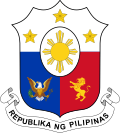| ||||||||||||||||
Four of 98 seats in the National Assembly of the Philippines | ||||||||||||||||
|---|---|---|---|---|---|---|---|---|---|---|---|---|---|---|---|---|
| ||||||||||||||||
 |
|---|
Four special elections (known elsewhere as "by-elections") were held on December 10, 1940, for vacant seats in the National Assembly of the Philippines, the legislative body of the Commonwealth of the Philippines. These elections were conducted to fill the seats left vacant by the appointment of Pedro Sabido as manager of the National Abaca and other Fibers Corporation in Albay's third district, the deaths of Ruperto Montinola in Iloilo's second district and Ruperto Kapunan in Leyte's fifth district, and the resignation of Felipe Buencamino Jr. in Nueva Ecija's second district. The date of the special elections was set by President Manuel L. Quezon through Proclamation No. 625 signed on October 4, 1940. [1]
Contents
The special elections were held on the same date as local elections for provincial, municipal and city officials. [2]